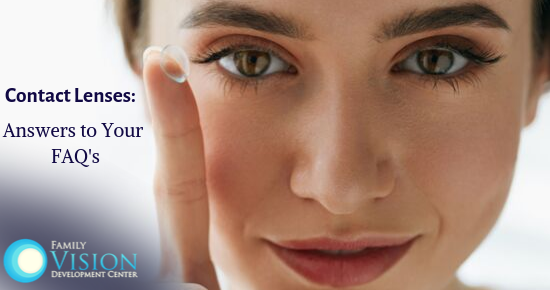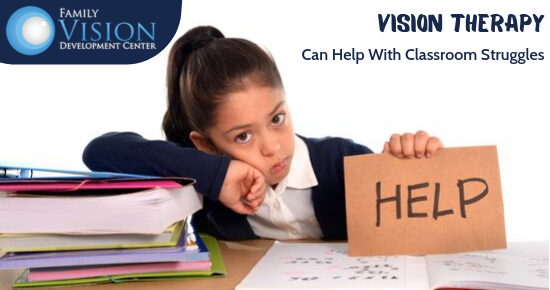There are different options for vision correction, and what you choose depends on a number of different factors. Family Vision Development Center offers a wide range of options for both eyeglasses and contact lenses. We will thoroughly explain the benefits of each during your comprehensive vision exam, but here are some basic facts about contacts to get you started:
Can I Wear Contact Lenses?
Most people are able to wear contact lenses safely and comfortably. There are contact lenses that correct for nearsightedness, farsightedness, astigmatism, and other vision problems. A comprehensive eye exam can determine what lenses are appropriate for you.
Are Contact Lenses Safe For My Eyes?
Millions of people wear contact lenses without any difficulties. Following recommendations for inserting, removing, cleaning, storing, and replacing contacts typically keeps your eyes safe and healthy. However, if you have specific concerns about contact lens safety, we are here to make sure your questions get answered.
What Is The Difference Between Hard And Soft Lenses?
Soft contact lenses are made of plastic combined with water. Soft lenses allow oxygen to pass through the material to your cornea, nourishing and soothing the surface of your eye. Rigid gas permeable contact lenses, sometimes called “hard lenses” are made from a stiffer, oxygen-permeable material. They are often used by individuals with astigmatism or higher-order aberrations.
How Often Should I Change My Contact Lenses?
The frequency with which you should dispose of lenses depends on the contact lens type. Some lenses are made to be disposed of each night, while others may last several weeks. Talk to us during your appointment and read the instructions on your contact lens package to determine the replacement schedule for your lenses.
Is It Possible To Lose A Contact Behind My Eye?
No. If you rub your eyes or swim underwater with contacts, it is possible to dislodge your contacts. Usually, they can be found under your upper eyelid and removed without difficulty.
How Long Does It Take To Adjust To Wearing Contacts?
If you’re not used to wearing contacts, you may notice them or feel slight discomfort for a day or two. As you become accustomed to the lenses, you will no longer even notice that they’re there.
There are a lot of variables to consider when choosing contact lenses. Think about your typical routine and talk to us during your eye exam to find the perfect selection for your lifestyle. Visit Family Vision Development Center in Aurora or contact us at 630-862-2020 to schedule your appointment.
Vision therapy, also referred to as vision training, neuro-vision therapy, or vision rehabilitation, is an optometry subspecialty. Vision therapy is a type of physical therapy for the eyes and brain, and is used to develop, improve and/or enhance visual function. Vision therapy can be beneficial for individuals of all ages. The goal of treatment is to work toward eliminating vision problems and improving a patient’s quality of life by maximizing vision performance and comfort.
How Vision Therapy Works
A vision therapy program involves a series of eye “exercises” and procedures, performed in the office by our highly-trained visual therapists, and specifically tailored to each individual patient. The in-office programs may involve the use of specialized equipment such as corrective or therapeutic lenses, prism lenses, balance boards or visual-motor-sensory integration training devices. Patients may also be given at-home exercises on a weekly basis in order to reinforce the progress made in the office.
A successful program can help a patient develop their visual skills and abilities, improve the efficiency of their vision, or change how they process or interpret visual information.
Who Benefits From Vision Therapy?
Vision therapy is especially beneficial for individuals with ocular motor dysfunctions, binocular dysfunctions, accommodative dysfunctions, visual motor and visual perception disorders, learning-related vision problems, traumatic brain injuries, myopia control, amblyopia, and strabismus. Vision therapy may also be prescribed for patients seeking sports vision enhancement.
An effective therapy program is customized to meet the needs of an individual. For example, if you are seeking sports performance enhancement, you will receive therapy designed to improve visual processing speeds, reaction times, visual endurance, accuracy, and eye teaming. Individuals with vision-related learning difficulties will receive therapy that focuses specifically on improving the visual input skills and visual processing skills required for efficient reading, writing, spelling and mathematics.
Family Vision Development Center Offers Expert Vision Therapy Programs
At Family Vision, our specialty is neuro-optometric rehabilitation and vision therapy. Dr. Martin is specially trained to treat a variety of vision related conditions using the most advanced and up-to-date vision therapy techniques, and Dr. Santoyo-Johnson is a board-certified Fellow in Light Therapy by the College of Syntonic Optometry. Our experience and dedication to the field allows our patients to feel confident that they are receiving the best care possible. Contact us at 630-862-2020 for more information or request an appointment online.
Additional information can be referenced here.



